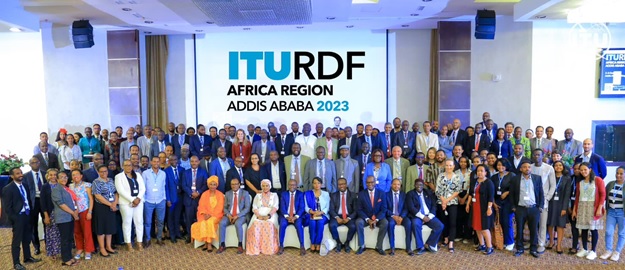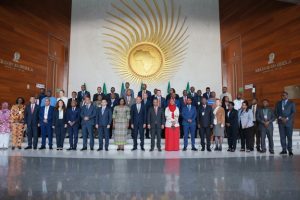
Technological development helps transforming economic activities and fastening industrialization across the world. Thanks to technology, livelihoods are transforming, though access to technology varies from continent to continent, from country to country and even within countries. Countries with better technologies are winning the battle against poverty and ensuring their prosperity, while countries with limited technological advancements remain poor and still continue fighting poverty.
These days, sustainable development is becoming unthinkable without technological advancements. New innovations and technological advancements are vital in transforming developments at macro and micro levels. Technological development is becoming a key factor in combating poverty and ensuring prosperity. The United Nations (UN) launched the 17 Sustainable Development Goals (SDGs) in 2015 with the goal of transforming the world where no one is left behind. The UN targets to achieve the SDGs by 2030 globally. Of the 17 SDGs, six have direct linkages with technology.
By making the latest technologies available for societies and making technological development inclusive, it would help accelerate and realize the SDGs and ensure that all people enjoy prosperity. In this regard, digitalization likely has a profound effect on accelerating the implementation of the SDGs as it helps transforming economic developments. Digitalization can be connected with human capital, industrialization, renewable energy, digital agriculture, smart cities and innovations.
Addis Ababa hosted the fifth International Telecommunication Union’s (ITU) Regional Development Forum (RDF) from October 3 to 5, 2023, under the theme “Digital transformation for a sustainable and equitable digital future: Accelerating the implementation of the SDGs in Africa through digital transformation”. During the discussion, the regional forum gives due focus to accelerating digitalization and achieving the SDGs in Africa.
During the forum, National ICT and Digital Economy Sector State Minister at Ethiopia’s Ministry of Innovation and Technology (MInT), Huria Ali said that accelerating digital transformation would help Africa to achieve SDGs. The forum, organized by ITU in collaboration with the Government of Ethiopia was attended by over 200 participants drawn from all parts of Africa. The State Minister said that the RDF which brings stakeholders of the continent to develop collaboration on ways of accelerating digital transformation and realizing SDGs in the continent. As to her, digital technology can play a vital role to overcome global challenges and build sustainable and equitable future for all.
“Africa is a young and dynamic continent with a rapidly growing population. We have a unique opportunity to leapfrog the traditional development process and inverse digital technologies to create a better future for our people. However, only 43% of the continent’s population has access to the internet,” Huria stated. The State Minister highlighted that solving the challenges needs timely collective action, especially in infrastructural investment and skill development, so as to ensure that everyone has the opportunity to participate in the digital economy as well as make sure that digital technologies are used in a way that is sustainable and equitable on the continent.
Recalling Ethiopia’s Digital 2025 Strategy, Huria underlines Ethiopia’s commitment to digital transformation mentioned the significant progress in recent years including liberalizing telecom sector, launching digital ID system and digital payment and promoting growth of e-commerce. The state minister stressed that “despite the efforts put, there is much to be done in the sector. Thus, we are committed to work with our partners across Africa and the world to achieve a sustainable and equitable digital future for all.”
Huria calls on all actors to invest in infrastructure and skill development to ensure that everyone has access to the internet and digital technologies on the continent. For her, ensuring technology, especially digital technology, would help to achieve the SDGs by the set period in Africa and across the planet. She calls for the promotion of the development and use of innovative digital solutions to address Africa’s challenges, such as healthcare, education, agriculture, climate change and other economic activities.
For his part, ITU Department Partnerships for Digital Development Chief, Cosmas Zavazava said that the forum is a platform for views exchange and matchmaking among stakeholders. “The regional development forum is one of the key events that we hold and the idea is to bring stakeholders together to brainstorm, to exchange ideas. But most importantly, this regional development forum is unique, unique in the sense that we are going to engage in a matchmaking exercise.”
It aims to convert pledges into concrete commitments that will result in the implementation of concrete impactful projects based on the priorities adopted and contained in the Kigali Action Plan, it was indicated. The Kigali Action Plan is a comprehensive package that will promote the equitable and sustainable development of telecommunication/ICT networks and services, it was learned.
Approached by EPA, Ethiopian Communication Authority (ECA) Director General, Balcha Roba said that it is the era of technology and without making technology inclusive; it is difficult to achieve the UN’s 2030 target of achieving SDGs. The UN’s 2030 target of SDGs has 17 goals and 169 targets to achieve by 2030 and the end goal is to eliminate poverty and hunger from the planet, he said.
For Balcha, by developing technology and making it inclusive, it creates job opportunities, promotes education, healthcare development, modernizes agriculture and other sectors that would help in improving the livelihoods of the people. Hence, he said, technological development accelerates economic development and helps to realize prosperity.
As to Balcha realizing the 2030 target of SDGs needs strong cooperation of all stakeholders and countries and the cooperation in the technology sector is among the priority areas to accelerate the implementation and realization of SDGs globally. “The RDF attended by 45 African countries with over 200 participants which includes policy makers, regulatory authorities, technology solution providers, operators and other stakeholders aims at ways to accelerate the development of digital technology in Africa and to accelerate SDGs,” he said.
“UN launched the 17 SDGs in 2015 to realize the goals by 2030, now only seven years are left as we are in 2023. Hence, the world needs strong collaborative efforts to realize the SDGs by the set target and technology would accelerate the realization,” ECA Director General said adding the RDF gives due focus on experience sharing and promoting best practices in digitalization in Africa.
For him, the implementation of SDGs faces a lot of challenges like the outbreak of COVID-19 and other crises. Hence, to accelerate the implementation of the goals to achieve the plan by 2030, investing in technology and making the technological advancements inclusive would accelerate the efforts in realizing the goals. In this regard, the advancement of digital transformation is becoming key accelerator of economic development; he said adding that expanding and making the digital development inclusive in Africa can help to accelerate the realization of the SDGs.
Citing the UN’s mid-term evaluation of the implementation of the SDGs, Blacha stated there are goals as intended that need further efforts to be realized during the set period. For him, to accelerate the implementation of the goals and realize them by 2030, it is critical to connect the goals with technology. Digital technology is among the accessible and easily expanded technology if countries and stakeholders give due attention to infrastructural development to make it inclusive. Making technology available to all societies would help accelerate the implementation efforts of the SDGs.
BY DARGIE KAHSAY
THE ETHIOPIAN HERALD FRIDAY 13 OCTOBER 2023





